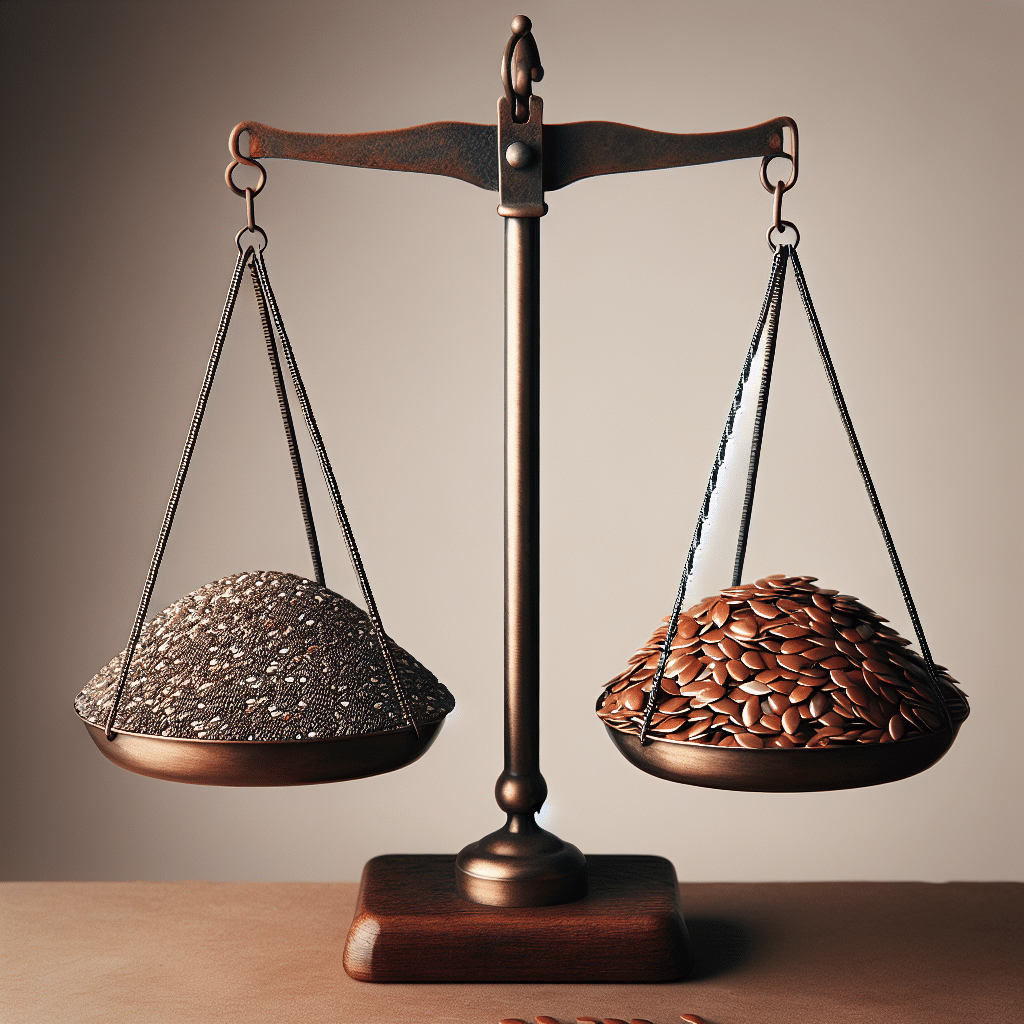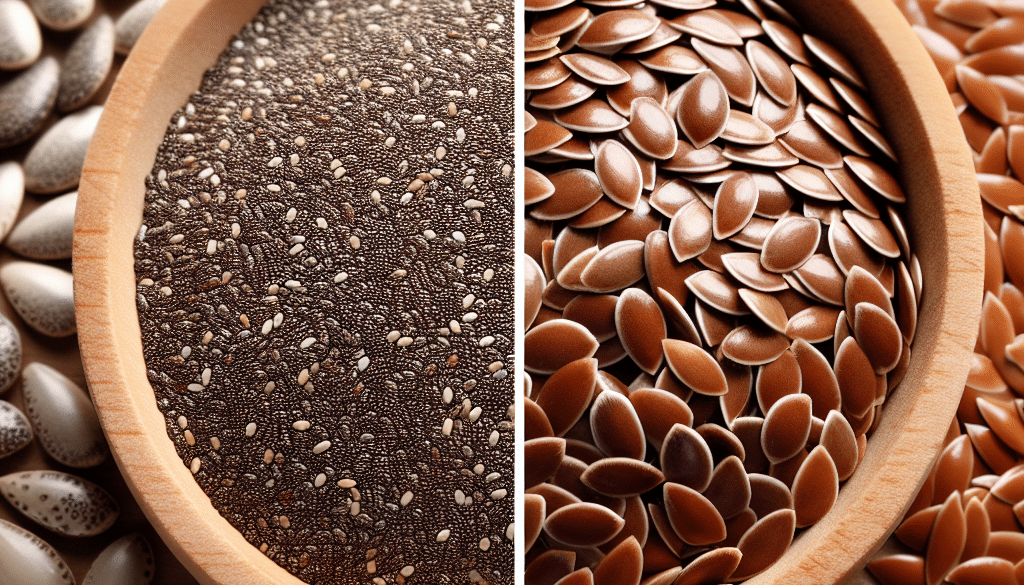Which Are Better Chia Seeds Or Flax Seeds?
-
Table of Contents
- Chia Seeds vs. Flax Seeds: Unveiling the Superior Superfood
- Nutritional Showdown: Chia Seeds vs. Flax Seeds
- Health Benefits: A Closer Look at Chia and Flax
- Usage and Versatility in the Kitchen
- Side Effects and Considerations
- Conclusion: Which Seed Reigns Supreme?
- Discover ETprotein’s Premium Protein Products
Chia Seeds vs. Flax Seeds: Unveiling the Superior Superfood

Superfoods have garnered significant attention in the health and wellness industry, with chia seeds and flax seeds often leading the conversation. These tiny seeds pack a nutritional punch and are associated with numerous health benefits. However, consumers frequently find themselves at a crossroads when deciding which seed is superior for their dietary needs. This article delves into the nutritional profiles, health benefits, and practical uses of chia seeds and flax seeds to determine which might be the better choice for you.
Nutritional Showdown: Chia Seeds vs. Flax Seeds
Both chia and flax seeds are rich in nutrients, but they have distinct profiles that may influence your choice depending on your health goals.
- Fiber: Chia seeds are an excellent source of fiber, with a remarkable 10 grams per ounce. Flax seeds also contain a high amount of fiber, around 8 grams per ounce. Fiber is essential for digestive health and can aid in weight management.
- Omega-3 Fatty Acids: Flax seeds are known for their high alpha-linolenic acid (ALA) content, a type of omega-3 fatty acid. While chia seeds also contain ALA, flax seeds have a slightly higher concentration, which is beneficial for heart health.
- Protein: Both seeds are good sources of plant-based protein, with chia seeds providing about 4 grams per ounce and flax seeds offering around 5 grams. Protein is crucial for muscle repair and growth.
- Lignans: Flax seeds are rich in lignans, which have antioxidant properties and may help reduce the risk of certain cancers. Chia seeds contain fewer lignans.
- Minerals: Chia seeds are rich in calcium, phosphorus, and magnesium, while flax seeds offer a good source of magnesium and phosphorus but less calcium.
Both seeds are low in carbohydrates and high in healthy fats, making them ideal for those following a ketogenic diet or looking to increase their intake of heart-healthy fats.
Health Benefits: A Closer Look at Chia and Flax
Chia and flax seeds have been linked to a variety of health benefits, some of which overlap due to their similar nutrient content.
- Heart Health: The omega-3 fatty acids in both seeds can help reduce inflammation, lower blood pressure, and decrease the risk of heart disease.
- Weight Management: The high fiber content in both seeds can help you feel full longer, reducing overall calorie intake and aiding in weight loss or maintenance.
- Diabetes Control: The fiber in chia and flax seeds can help regulate blood sugar levels, making them beneficial for individuals with diabetes.
- Digestive Health: Fiber also promotes regular bowel movements and can help prevent constipation.
- Cancer Prevention: The lignans in flax seeds have been studied for their potential role in reducing the risk of breast and prostate cancer.
While both seeds offer impressive health benefits, flax seeds’ higher lignan content may give them an edge in cancer prevention.
Usage and Versatility in the Kitchen
When it comes to incorporating these seeds into your diet, both chia and flax seeds are versatile and can be used in a variety of dishes.
- Chia Seeds: They can be eaten raw, soaked in juice, added to porridges and puddings, or incorporated into baked goods. Chia seeds can also serve as an egg substitute in recipes for those following a vegan diet.
- Flax Seeds: Flax seeds can be ground into a meal and used in smoothies, oatmeal, and baked goods. They also act as an egg substitute and can be used to make flax eggs for vegan recipes.
However, it’s important to note that flax seeds need to be ground to be fully digested and absorbed by the body, whereas chia seeds do not. This could be a consideration for convenience and ease of use.
Side Effects and Considerations
While chia and flax seeds are generally safe for consumption, they can cause side effects in some individuals. Excessive consumption of either seed can lead to gastrointestinal issues such as bloating, gas, and abdominal pain due to their high fiber content. Additionally, those with a history of hormone-sensitive cancers should consult with a healthcare provider before consuming large amounts of flax seeds due to their lignan content.
Conclusion: Which Seed Reigns Supreme?
In the battle between chia seeds and flax seeds, there is no clear winner. Both seeds offer unique nutritional benefits and can be valuable additions to a balanced diet. The choice between chia and flax seeds may ultimately come down to personal preference, dietary restrictions, or specific health goals. For those seeking higher fiber or calcium intake, chia seeds may be the better option. Conversely, if you’re looking for a boost in omega-3s or lignans, flax seeds might be preferable.
Regardless of which seed you choose, incorporating either into your diet can contribute to overall health and well-being. As with any dietary change, it’s best to start with small amounts and gradually increase your intake to avoid digestive discomfort.
Discover ETprotein’s Premium Protein Products
If you’re looking to enhance your diet with high-quality protein sources, consider exploring ETprotein’s range of organic bulk vegan proteins. Their products, including organic rice protein, pea protein, and various seed proteins, are non-GMO, allergen-free, and boast a neutral taste. ETprotein’s offerings cater to a diverse range of industries and dietary needs, ensuring that you can find the perfect protein solution for your health goals.
About ETprotein:
ETprotein, a reputable protein and L-(+)-Ergothioneine (EGT) Chinese factory manufacturer and supplier, is renowned for producing, stocking, exporting, and delivering the highest quality organic bulk vegan proteins and L-(+)-Ergothioneine. They include Organic rice protein, clear rice protein, pea protein, clear pea protein, watermelon seed protein, pumpkin seed protein, sunflower seed protein, mung bean protein, peanut protein, and L-(+)-Ergothioneine EGT Pharmaceutical grade, L-(+)-Ergothioneine EGT food grade, L-(+)-Ergothioneine EGT cosmetic grade, L-(+)-Ergothioneine EGT reference grade and L-(+)-Ergothioneine EGT standard. Their offerings, characterized by a neutral taste, non-GMO, allergen-free attributes, with L-(+)-Ergothioneine purity over 98%, 99%, cater to a diverse range of industries. They serve nutraceutical, pharmaceutical, cosmeceutical, veterinary, as well as food and beverage finished product distributors, traders, and manufacturers across Europe, USA, Canada, Australia, Thailand, Japan, Korea, Brazil, and Chile, among others.
ETprotein specialization includes exporting and delivering tailor-made protein powder and finished nutritional supplements. Their extensive product range covers sectors like Food and Beverage, Sports Nutrition, Weight Management, Dietary Supplements, Health and Wellness Products, and Infant Formula, ensuring comprehensive solutions to meet all your protein needs.
As a trusted company by leading global food and beverage brands and Fortune 500 companies, ETprotein reinforces China’s reputation in the global arena. For more information or to sample their products, please contact them and email sales(at)ETprotein.com today.














